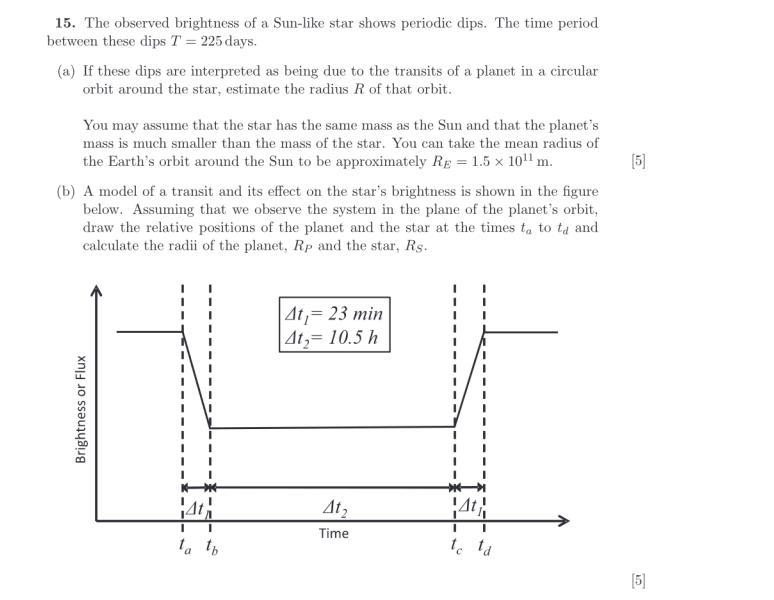Question
15. The observed brightness of a Sun-like star shows periodic dips. The time period between these dips T = 225 days. (a) If these

15. The observed brightness of a Sun-like star shows periodic dips. The time period between these dips T = 225 days. (a) If these dips are interpreted as being due to the transits of a planet in a circular orbit around the star, estimate the radius R of that orbit. You may assume that the star has the same mass as the Sun and that the planet's mass is much smaller than the mass of the star. You can take the mean radius of the Earth's orbit around the Sun to be approximately Rg = 1.5 x 10 m. (b) A model of a transit and its effect on the star's brightness is shown in the figure below. Assuming that we observe the system in the plane of the planet's orbit, draw the relative positions of the planet and the star at the times to to ta and calculate the radii of the planet, Rp and the star, Rs. Brightness or Flux At I I ta tb At= 23 min At = 10.5 h 41 Time At I [5] [5]
Step by Step Solution
There are 3 Steps involved in it
Step: 1

Get Instant Access to Expert-Tailored Solutions
See step-by-step solutions with expert insights and AI powered tools for academic success
Step: 2

Step: 3

Ace Your Homework with AI
Get the answers you need in no time with our AI-driven, step-by-step assistance
Get StartedRecommended Textbook for
Calculus Early Transcendentals
Authors: James Stewart
7th edition
538497904, 978-0538497909
Students also viewed these Physics questions
Question
Answered: 1 week ago
Question
Answered: 1 week ago
Question
Answered: 1 week ago
Question
Answered: 1 week ago
Question
Answered: 1 week ago
Question
Answered: 1 week ago
Question
Answered: 1 week ago
Question
Answered: 1 week ago
Question
Answered: 1 week ago
Question
Answered: 1 week ago
Question
Answered: 1 week ago
Question
Answered: 1 week ago
Question
Answered: 1 week ago
Question
Answered: 1 week ago
Question
Answered: 1 week ago
Question
Answered: 1 week ago
Question
Answered: 1 week ago
Question
Answered: 1 week ago
Question
Answered: 1 week ago
Question
Answered: 1 week ago
View Answer in SolutionInn App



